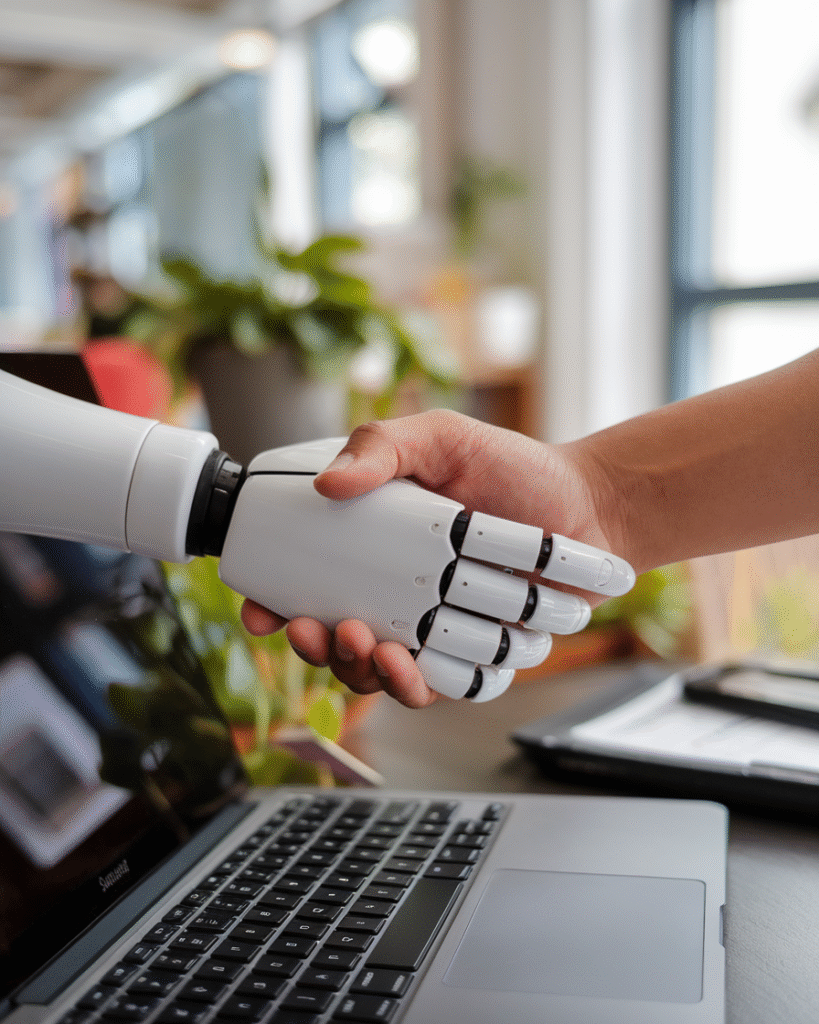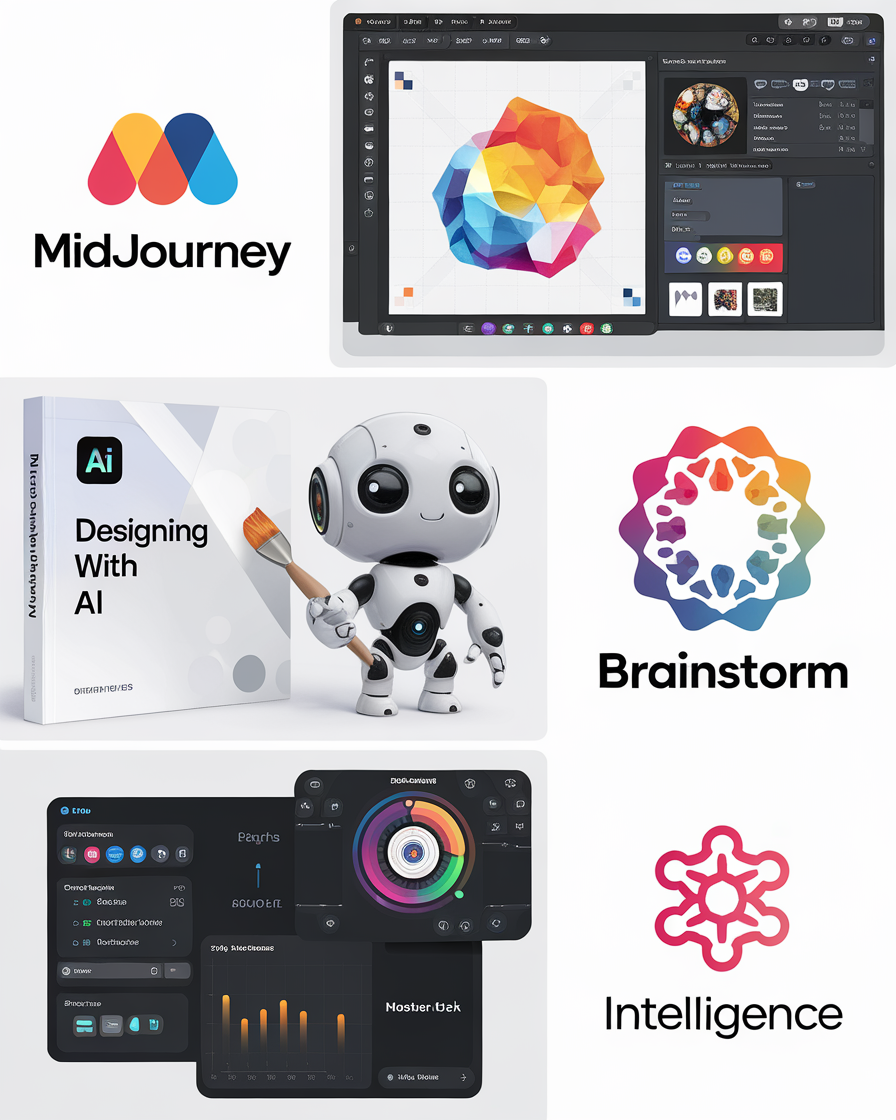AI Replace Your Day Job is no longer just a hypothetical phrase—it’s a reality unfolding across industries worldwide. At RiseviaAI, our story started with a simple mission: helping people embrace AI’s potential while securing their careers and income. Founded to merge artificial intelligence with personal growth, we’ve seen firsthand how AI isn’t just replacing jobs; it’s also creating new ways to thrive. In this article, we’ll dive into how AI is reshaping the job market, whether it can really make you money online, and how you can future-proof your livelihood.
Discover great ideas like how AI impacts mental wellness and careers here.
Table Of Contents
- Understanding the Rise of AI in the Workplace
- Will AI Replace Online Jobs?
- Can AI Really Make You Money Online?
- Will AI Replace Me at My Job?
- Will Sales Jobs Be Replaced by AI?
- The Positive Side of AI Replacing Jobs
- The Future of AI and Human Collaboration
- Case Studies of Individuals Who Leveraged AI
- Conclusion: How to Thrive in an AI-Driven World
- Frequently Asked Questions About AI and Jobs
Understanding the Rise of AI in the Workplace
How AI Replace Your Day Job Became a Global Concern
AI Replace Your Day Job is not a mere headline—it reflects a global shift happening across industries. In the past decade, artificial intelligence has moved from niche experiments to mainstream applications, transforming the way companies operate and how individuals work. Automation tools, machine learning algorithms, and intelligent systems now handle tasks once reserved for human workers.
Industries from finance to healthcare have embraced AI for its speed, accuracy, and cost-effectiveness. For example, customer service bots now resolve inquiries 24/7, and data analytics tools scan millions of records in seconds—work that previously required large teams. As a result, workers in roles such as data entry, basic customer support, and even journalism are beginning to ask: Could AI replace my job next?
But it’s not all bad news. While many fear displacement, AI is also creating new roles in tech, ethics, and creative industries. Understanding where AI is heading is the first step to preparing for its impact on your career.
Why AI Replace Your Day Job Fears Are Spreading Fast
The phrase AI Replace Your Day Job isn’t only about technological progress—it’s about how rapidly it’s happening. Reports from McKinsey and Gartner indicate that up to 30% of jobs globally could be automated by 2030. That’s just five years away.
Jobs involving predictable, repetitive tasks are the first to face automation. Cashiers, call center agents, and administrative assistants already see AI encroaching on their work. Even creative fields aren’t immune, with AI-generated art and writing gaining traction.
Still, some industries remain resistant. Healthcare, education, and roles requiring complex human interaction are difficult for AI to fully replace. Instead of fearing AI, workers need to ask a more important question: How can I leverage AI to make myself indispensable?
By upskilling, embracing technology, and focusing on tasks requiring emotional intelligence and creativity, you can turn this disruption into an opportunity.
Will AI Replace Online Jobs?

Examining Remote Work Vulnerability in the AI Era
The question “Will AI replace online jobs?” is on the minds of millions who rely on remote work for their income. With the rise of AI-powered platforms, tasks once outsourced to human freelancers are now being automated. Virtual assistants, data entry specialists, and even social media managers are seeing AI tools encroach on their responsibilities.
For example, AI systems like chatbots now handle customer support around the clock, and advanced algorithms are scheduling social posts more efficiently than human teams ever could. This shift has left many wondering if their work-from-home career is sustainable in the next decade.
But here’s the truth: not all online jobs are equally at risk. Roles requiring strategic thinking, emotional intelligence, and creativity—such as marketing strategists, UX designers, and copywriters—remain difficult for AI to replicate fully.
Explores how AI is reshaping employment and why upskilling is crucial : OECD: AI and the Future of Work
To stay ahead, workers must shift from performing routine tasks to mastering skills that leverage AI as a collaborator rather than a competitor. Discover great ideas like how to build passive income streams with AI here.
Which Online Careers Are AI-Proof and Why
While automation is rising, not all hope is lost for remote workers. AI Replace Your Day Job scenarios are less likely in fields where human insight is irreplaceable. For instance:
- Consulting and coaching: Emotional intelligence and deep personal engagement keep these roles secure.
- Creative design and content creation: While AI can generate drafts, it often lacks nuance, originality, and cultural context.
- Complex project management: Orchestrating multi-layered projects still requires human judgment.
Embracing AI doesn’t mean surrendering your career. Instead, it’s about using these tools to enhance your productivity and create new opportunities. For example, entrepreneurs are now using AI for market research, content ideation, and automating administrative work—freeing time for strategic growth.
Check out how you can be financially free using AI to see real-world applications that are changing lives.
By understanding which jobs are at risk and which are resistant, you can position yourself in the safest zones of the digital economy and even scale up your earning potential.
Can AI Really Make You Money Online?
Opportunities Created by AI Technologies
Many wonder, can AI really make you money online—or is it just hype? The truth is, artificial intelligence is creating more pathways to online income than ever before. From AI-driven trading algorithms to content creation tools, the digital landscape is brimming with possibilities.
For instance, AI-powered platforms like ChatGPT, Jasper, and Midjourney now enable individuals to build businesses around writing, design, and customer service without hiring large teams. This democratization of technology means anyone with internet access can tap into AI’s capabilities.
According to a report by Forbes, entrepreneurs are leveraging AI to create passive income streams in eCommerce, stock trading, and affiliate marketing. These tools automate repetitive tasks and free up time for high-value strategic decisions.
Even freelancers are finding ways to scale their income by using AI to handle low-level work, allowing them to focus on premium services that require human touch.
Will AI Replace Me at My Job?
Signs Your Job Could Be Automated
The fear of “Will AI replace me at my job?” is no longer limited to factory workers or cashiers. Professionals across industries are now asking the same question as artificial intelligence grows more capable every year.
Roles that involve repetitive and predictable tasks are especially vulnerable. If your daily work centers on data entry, scheduling, or basic customer service, chances are AI systems can already perform these tasks faster, more accurately, and without fatigue. Even mid-level jobs in fields like finance, journalism, and logistics are beginning to see a shift as companies adopt machine learning tools for greater efficiency.
A telling sign of vulnerability is when your work follows set rules and doesn’t require emotional intelligence or creative problem-solving. Jobs heavy on pattern recognition but light on innovation are typically first in line for automation.
But before panicking, it’s critical to realize that AI doesn’t necessarily mean outright job elimination. In many cases, it changes how roles are performed, shifting human workers toward higher-level oversight and strategy.
How AI could create more roles than it eliminates in the long run
How to Future-Proof Your Career Against AI
The best response to the question “Will AI replace me at my job?” is action. Future-proofing your career starts with embracing change rather than resisting it. Here are practical steps:
- Upskill Continuously: Learn to work alongside AI by mastering technologies relevant to your industry. Skills in AI oversight, critical thinking, and cross-disciplinary problem-solving will make you invaluable.
- Focus on Human-Centric Abilities: Creativity, leadership, emotional intelligence, and ethical judgment are domains where humans still outperform machines. Strengthen these to stay irreplaceable.
- Adopt a Growth Mindset: Accept that AI is a permanent fixture of the workplace. Workers who thrive see it as a tool, not a threat, and adapt by reimagining their roles around its capabilities.
By shifting your perspective from fear to opportunity, you transform “AI Replace Your Day Job” from a looming crisis into a powerful motivator to grow, pivot, and lead in an AI-powered economy.
This mindset is what separates those who lose ground to automation from those who use it as a launchpad for their next career move.
Will Sales Jobs Be Replaced by AI?

AI’s Role in Sales Automation
The idea of AI replacing traditional sales roles is gaining traction as companies integrate intelligent systems into their operations. Customer Relationship Management (CRM) platforms now use AI to analyze customer behavior, predict buying patterns, and automate follow-up emails. Chatbots are handling initial inquiries, qualifying leads, and even upselling products—tasks that once kept human salespeople busy for hours.
Predictive analytics takes this a step further by allowing organizations to anticipate customer needs before they are even voiced. For example, machine learning algorithms can suggest when to contact a client or which product is most likely to convert, streamlining the entire sales process.
It’s no wonder many workers in sales are asking themselves, “Will AI replace me at my job?” The answer isn’t as straightforward as it may seem.
Why Human Salespeople Are Still Essential
While AI systems excel at processing massive amounts of data and automating routine tasks, they lack the human qualities that define successful sales relationships. Selling isn’t purely transactional; it’s deeply relational.
Empathy, active listening, and the ability to build trust are critical skills in high-stakes negotiations or complex B2B deals. These are areas where AI falls short. A chatbot can answer questions, but it cannot read between the lines, sense hesitation in a client’s voice, or pivot its pitch based on subtle emotional cues.
Moreover, in industries like real estate, luxury goods, and enterprise software, buyers often need the reassurance of human expertise before making significant financial commitments. No algorithm can replicate the confidence that comes from sitting across from a seasoned professional who understands their unique needs.
Rather than fearing replacement, sales professionals should view AI as a partner. It can handle data-heavy tasks, leaving humans free to focus on relationship building and strategic selling—two areas where machines still struggle to compete.
By adopting this mindset, you transform the narrative from “AI Replace Your Day Job” to “AI Reinforce Your Success.”
The Positive Side of AI Replacing Jobs
New Career Paths Emerging With AI
While much of the conversation around AI Replace Your Day Job focuses on threats, there’s an equally compelling narrative of opportunity. Artificial intelligence isn’t just eliminating roles—it’s creating entirely new ones that didn’t exist a decade ago.
For example, jobs like AI ethicists, prompt engineers, and machine learning trainers have emerged as crucial parts of today’s workforce. As organizations race to integrate AI responsibly, they require human oversight to ensure algorithms align with ethical standards and societal needs.
There’s also a surge in demand for professionals who can bridge the gap between technology and people. Roles in AI implementation, user experience design for intelligent systems, and hybrid tech-support positions are rapidly growing.
This evolution of work means that individuals willing to learn, adapt, and pivot can thrive in industries once considered unrelated to technology. It’s a reminder that the future of work isn’t about fighting AI—it’s about collaborating with it.
How AI Can Improve Work-Life Balance
Another overlooked benefit of AI’s rise is its potential to improve quality of life. By automating mundane, repetitive tasks, AI enables workers to focus on meaningful, high-impact projects that demand creativity and human judgment.
Imagine a workplace where employees no longer waste hours sifting through spreadsheets or responding to low-level emails. Instead, they use that time to innovate, strategize, or even spend more hours with their families.
This shift doesn’t just enhance productivity—it promotes mental wellness and satisfaction. Companies embracing AI are discovering that it can serve as a catalyst for a healthier work-life balance, rather than a disruptor.
When viewed through this lens, AI Replace Your Day Job transforms from a fear-laden phrase into a beacon of hope for a smarter, more fulfilling future of work. The key lies in actively shaping your career trajectory around these technological changes, rather than resisting them.
The Future of AI and Human Collaboration
Embracing AI as a Co-Worker
The fear surrounding AI Replace Your Day Job often overshadows a crucial truth: the future of work isn’t humans versus machines—it’s humans with machines. As AI continues to evolve, it’s becoming clear that the most successful workplaces will feature a seamless blend of human ingenuity and artificial intelligence efficiency.
Think of AI not as a rival, but as an advanced tool or even a partner. It can analyze complex data sets in seconds, flagging patterns that humans might overlook. Meanwhile, employees bring emotional intelligence, ethical judgment, and creativity—elements AI simply cannot replicate.
In industries like healthcare, AI assists doctors by quickly analyzing medical scans, but it’s the human physicians who make final decisions and offer compassionate care. In journalism, AI drafts initial news reports, but seasoned editors refine them for accuracy, context, and tone. This emerging model of collaboration highlights a powerful synergy where each party amplifies the other’s strengths.
Industries Set to Flourish Because of AI
While some industries face disruption, others are poised for incredible growth as they integrate artificial intelligence. Sectors like renewable energy, education, and advanced manufacturing are leveraging AI to innovate faster and scale operations more efficiently.
In education, AI tutoring systems provide personalized learning experiences, freeing teachers to focus on mentorship and complex student needs. In manufacturing, smart robots handle repetitive assembly tasks, while engineers supervise, innovate, and maintain quality control.
Rather than fearing “AI Replace Your Day Job,” forward-thinking professionals are asking: How can I position myself within industries that thrive because of AI? This mindset opens doors to exciting career opportunities and allows individuals to shape their own future of work.
The reality is that AI doesn’t diminish the human role; it redefines it. Those who embrace this shift will not only secure their jobs but also discover ways to excel in an AI-augmented world.
Case Studies of Individuals Who Leveraged AI

From Job Loss to AI Entrepreneurship
For some, AI Replace Your Day Job is no longer a question of if—but when. Yet many who have faced job loss due to automation have turned their challenges into opportunities, launching entirely new careers powered by artificial intelligence.
Consider the story of a marketing professional whose role was downsized when her company adopted AI-powered content automation tools. Instead of resisting the change, she took online courses in AI prompt engineering and began offering AI consulting services to small businesses. Within a year, she transformed her career trajectory, earning more than in her previous role and enjoying greater flexibility.
This isn’t an isolated case. Across industries, workers are pivoting into AI-related roles such as machine learning trainers, chatbot designers, and AI ethicists. By embracing technology rather than fearing it, they’ve proven it’s possible to move from displacement to leadership in the AI revolution.
How Companies Are Training Employees to Adapt to AI
Forward-thinking organizations are also helping their staff stay ahead of automation. Tech companies, financial institutions, and even government agencies are rolling out reskilling programs to prepare workers for AI integration.
For example, employees previously tasked with manual data entry are being trained in data analysis and AI system management. In retail, workers are learning to operate AI-powered inventory systems and gain insights from predictive analytics dashboards.
This proactive approach underscores an essential truth: the rise of artificial intelligence isn’t about replacing humans wholesale—it’s about redefining roles to combine the best of human and machine capabilities.
By highlighting these stories, we see that “AI Replace Your Day Job” doesn’t have to end with loss. With adaptation, it can mark the beginning of a more empowered, future-ready career.
Conclusion: How to Thrive in an AI-Driven World
AI Replace Your Day Job doesn’t have to be a headline that inspires fear—it can be the wake-up call you need to reimagine your career. Across industries, artificial intelligence is redefining roles, automating repetitive tasks, and opening doors to new opportunities that didn’t exist a decade ago.
The key difference between those who struggle in this shift and those who thrive lies in mindset and preparation. Workers clinging to outdated models risk displacement, while those willing to learn, adapt, and collaborate with AI are building future-proof careers.
Start by assessing your current skill set. Are your daily tasks highly predictable? If so, consider reskilling in areas where human strengths like creativity, emotional intelligence, and ethical judgment are indispensable. Explore opportunities to integrate AI into your work instead of resisting it. This could mean learning to manage AI tools, designing AI-driven workflows, or even launching your own AI-enabled venture.
Remember, AI is not here to replace your value—it’s here to amplify it. By embracing its capabilities, you free yourself from repetitive work and focus on strategic, high-impact areas where you can excel.
The future belongs to professionals who see artificial intelligence as a collaborator, not a competitor. Instead of fearing “AI Replace Your Day Job,” take proactive steps to make AI your greatest ally in achieving career growth, financial freedom, and a more balanced life.
Your journey doesn’t end here. It begins now—with the decision to lead, innovate, and thrive in a world shaped by artificial intelligence.
Frequently Asked Questions About AI and Jobs
Will AI replace me at my job?
The answer depends on your industry, role, and willingness to adapt. Jobs heavily reliant on predictable, routine tasks—such as administrative support or assembly line work—are most susceptible to automation.
But jobs demanding human qualities like empathy, ethical judgment, and complex decision-making remain largely secure. Teachers, healthcare workers, and leaders in creative industries exemplify roles that AI cannot fully replicate.
To protect your career, focus on reskilling and upskilling. Learn to use AI tools relevant to your field, and cultivate human-centric abilities like leadership and communication. Rather than fearing “AI Replace Your Day Job,” you can prepare to thrive in an AI-augmented workplace.
Can AI really make you money online?
Yes, AI can absolutely make you money online when used strategically. Entrepreneurs and freelancers alike are leveraging artificial intelligence to build income streams in areas such as eCommerce, affiliate marketing, and digital content production.
AI tools can automate tedious tasks like keyword research, social media management, and customer interactions, freeing time for more strategic efforts. Additionally, platforms like AI trading bots or content automation software enable passive income opportunities for those willing to invest time upfront.
It’s important to note, though, that while AI provides the tools, success still requires human oversight, creativity, and business acumen. When used effectively, AI shifts the narrative from “AI Replace Your Day Job” to “AI Amplify Your Earning Potential.”
Will AI replace online jobs?
The rise of AI-powered tools is already transforming the online job landscape. Tasks like data entry, customer support, and social media scheduling are increasingly automated with chatbots, virtual assistants, and content creation algorithms. While these technologies improve efficiency, they also threaten roles that depend on repetitive, predictable workflows.
To avoid being caught in the wave of automation, individuals must adapt by acquiring new skills and embracing AI as a productivity partner. By doing so, they can stay relevant and even elevate their online careers. For many, the fear of “AI Replace Your Day Job” can become motivation to innovate.



